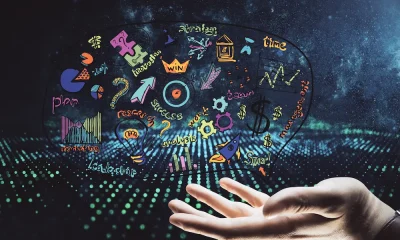Marketing
Essential Marketing Strategies for AI Startups: Leveraging the Future of Digital Promotion

The digital landscape is evolving quickly, providing AI startups unique opportunities to distinguish themselves and captivate their target markets. For example, the US AI market cap is estimated to reach a whopping $299.64 billion by 2026. Additionally, there are already more than 70,000 AI companies worldwide.
However, AI startups also need guidance on which marketing strategies will embrace the power of artificial intelligence to tap into the future of digital promotion.
Recommended as part of their marketing, AI startups can leverage AI to predict trends, personalize experiences, and make data-driven decisions, setting new standards for customer connections and outpacing competitors.
The key for AI startups and all companies lies in integrating AI into every facet of marketing, from content creation to customer engagement, ensuring a seamless and sophisticated journey for the business and its clientele.
As AI continues to disrupt the status quo, AI startups that harness their capabilities in their marketing efforts are poised to lead the charge into a new era of digital sophistication. Essential AI marketing strategies are needed by all businesses, including AI Startups.
Marketing Strategies For AI Startups
Marketing strategies for AI startups may be similar to what other startups and businesses adopting digital marketing deploy. For example, posting on social media, providing insightful content on their blogs, and networking at industry events. However, each business needs to focus on its core discipline.
For AI startups, that focus must be showcasing their technological edge and translating complex AI capabilities into tangible customer benefits.
Build Brand
AI startups must quickly position themselves as innovators, attracting early adopters and tech-savvy consumers eager to experience the next wave of technological solutions. They must engage in strategic partnerships to build their market and brand.
Credibility and establishing themselves as authorities in their field can come from showing their target market as educators and thought leaders. For example, don’t be reluctant to share insightful content on AI advancements and their implications on blogs and social media sites like LinkedIn.
Use AI Tools In Marketing
Additionally, all businesses are encouraged to use AI in marketing to optimize marketing efforts, and consumers expect AI startups to also use AI-powered solutions and tools even when they are not their own. This demonstrates the startup’s product efficacy and serves as a testament to the practical benefits of AI in a real-world setting, providing a compelling narrative for potential clients and investors.
Customer Success Stories
Finally, all businesses must present client case studies, and AI startups must prioritize their customer success stories. When they submit AI tools and showcase how their AI solutions solve real problems and drive growth for their clients, startups create relatable success narratives that resonate with prospects.
These stories serve as powerful testimonials to the effectiveness of their AI solutions, reinforcing the value proposition and encouraging adoption.
AI in the Marketing Landscape
For a more general overview of AI in marketing, we start with what it means in the marketing landscape. AI refers to using intelligent algorithms and machine learning to enhance content creation and streamline campaign execution.
By leveraging AI, marketers can generate sophisticated content that resonates with target audiences, achieve greater personalization, and optimize the overall marketing strategy to drive engagement and conversions.
The Intersection of AI and Digital Marketing
The intersection of AI and digital marketing is where data meets creativity. AI’s ability to analyze trends and consumer behaviour enhances content creation, enabling marketers to craft messages that truly resonate. Brands can predict and deliver what customers want through dynamic, personalized marketing campaigns.
How AI Transforms Marketing Objectives and KPIs
AI in marketing transforms traditional objectives and KPIs, shifting focus towards predictive analytics and real-time performance metrics. It enables marketers to set more ambitious goals, backed by data-driven insights, and measure success through enhanced KPIs that reflect the depth and breadth of its impact on consumer engagement and conversion rates.
Crafting Your AI Marketing Strategy
An effective AI marketing strategy is built on clear goals that align with a startup’s AI capabilities. This involves identifying AI’s unique advantages, such as advanced analytics and automation, and integrating these features into a cohesive plan to achieve measurable outcomes that drive growth and innovation.
Set Clear Goals with AI Capability in Mind
Setting clear goals with AI capability in mind requires understanding how AI can enhance marketing analytics. Startups must define specific objectives that AI tools can realistically achieve, such as improving lead generation or customer segmentation, ensuring that the AI implementation is purpose-driven and aligned with the overall business strategy.
Compare Your Strategy to Market Standards
Benchmarking against market standards is essential for AI startups to understand their competitive stance. It involves assessing the effectiveness of their AI marketing strategy in comparison to industry norms. This process helps identify areas of strength and opportunities for improvement, ensuring a market-relevant approach that resonates with current trends and consumer expectations.
AI-Powered Keyword Research and Audience Insights
AI-powered tools are game-changers for keyword research and audience insights. These tools help identify relevant keywords and better understand customer pain points by analyzing vast data. Startups can craft content that aligns with these insights, catering to their target audience’s needs and interests.
Deploying AI for Enhanced Customer Engagement
Leveraging AI to drive growth in customer engagement is about harnessing the technology to enrich customer service and create memorable interactions. AI facilitates a more personalized and responsive approach to customer engagement, empowering startups to deliver superior experiences that foster loyalty and advocacy.
Revolutionizing Customer Service
Chatbots are revolutionizing customer service by enabling businesses to create personalized interactions at scale. Through AI, chatbots can handle inquiries with speed and accuracy, significantly improving customer satisfaction. They provide immediate assistance, ensuring customers feel heard and valued, which is crucial for building trust and long-term relationships.
Creating Tailored Content at Scale
Personalization in marketing leverages AI to deliver content that resonates on an individual level. AI analyzes customer data to produce tailored messages and recommendations, enhancing the consumer experience with a sense of personal touch, which is integral for engagement in today’s saturated digital landscape.
Engaging Visuals with Less Effort
AI’s ability to analyze visual content has made it easier than ever for startups to create engaging video content. By understanding what visuals capture attention, AI can assist in producing impactful video content that requires less effort from marketers yet yields higher engagement rates from audiences.
Selecting the Right AI Tools for Your Marketing Arsenal
AI tools are crucial for effectively analyzing customer data and executing a successful marketing strategy. AI startups must carefully evaluate tools that align with their specific needs, choosing those that offer robust analytics capabilities and integrate seamlessly into their existing marketing stack.
Comprehensive AI Marketing Platforms
Comprehensive AI marketing platforms are indispensable for AI startups, offering tools to analyze customer data, generate personalized content, and send targeted marketing messages. These platforms empower marketing teams to gain valuable insights into customer behaviours and preferences.
Harnessing the power of AI allows businesses to optimize their marketing efforts, tailoring strategies to meet the nuanced demands of their audience. Salesforce Einstein is an example of such a platform, providing a robust framework for companies to enhance their customer relations and drive sales conversions.
Specialized Tools for Segmentation and Automation
Specialized AI tools elevate marketing by focusing on segmentation and automation, allowing businesses to create personalized experiences at scale. AI algorithms segment audiences with precision, identifying intricate patterns in consumer behaviour.
When paired with automation, this segmentation enables marketers to deliver highly personalized content to the right audience at the right time. As a result, marketing teams can optimize their marketing efforts more efficiently, ensuring that each marketing message is as relevant and engaging as possible.
AI Solutions for Social Media and Email Campaigns
AI systems are revolutionizing social media and email campaigns through advanced ad targeting and content optimization. Analyzing vast datasets means these AI solutions can predict the types of content that resonate with individual users, ensuring that marketing messages are tailored to the preferences of each recipient. This level of customization enhances user engagement and streamlines the campaign management process, allowing for a more effective allocation of advertising resources.
Integrating AI into Your Content Marketing Strategy
AI startups must integrate AI into their content marketing strategy to harness the most significant potential for success. By utilizing data-driven insights, AI can assist in crafting high-quality content that captivates the target audience.
Areas where AI can significantly impact include creating engaging content, devising targeted content strategies, and providing customer lifetime value predictions. These practical strategies ensure that content marketing efforts are efficient and resonate deeply with consumers.
Content Creation and Curation through AI
AI-driven tools transform content creation and curation by enabling personalized content delivery across various marketing channels. AI can curate a selection of content that aligns with each user’s unique interests by analyzing individual preferences. This approach increases content’s relevance for the end consumer and streamlines the content development process for marketing teams, ensuring a consistent and personalized brand experience.
SEO Optimization with AI Analytics
AI analytics reshapes SEO optimization by providing real-time insights that guide content marketing strategy. These tools can use machine learning algorithms to identify search trends and keyword opportunities, allowing marketers to refine their content for better visibility and higher rankings. With AI analytics, the guesswork is removed from SEO, leading to more strategic decisions that align with the evolving landscape of search engine algorithms.
Timing and Channel Strategies with AI
AI is also revolutionizing content distribution by optimizing timing and channel strategies. AI tools analyze user engagement patterns to determine the best moments to publish content, ensuring maximum visibility. Additionally, by evaluating the performance of different marketing channels, AI can allocate resources more effectively, enhancing the overall reach and impact of content marketing campaigns.
Looking Ahead With AI in Marketing
The marketing landscape is on the cusp of a revolution, with AI at the forefront, promising unprecedented business capabilities. As we peer into the future, artificial intelligence catalyzes a transformative shift in how brands connect with their audience, offering personalized experiences at scale and insights that drive strategic decision-making.
Predictive Analytics and Consumer Behavior Forecasting
Predictive analytics empowers businesses to harness AI’s power, utilizing algorithms to analyze historical data and machine learning algorithms to analyze historical trends. This equips marketers with the foresight to anticipate customer needs, tailor messaging, and make informed decisions that resonate with consumers before they articulate their desires, thereby shaping a proactive marketing approach.
The Emerging Role of AI in Marketing Creativity and Design
In marketing creativity and design, leveraging AI enables businesses to blend data-driven insights with artistic innovation. AI tools digest customer preferences and data to identify patterns, enhancing customer segmentation and enabling marketing teams to create personalized and relevant content. This symbiosis of creativity and technology is transforming existing content and helping brands to anticipate customer reactions better.
AI as a Tool for Market Expansion and Global Reach
AI is a formidable force for businesses looking to expand their market presence and achieve global reach. By providing personalized experiences and insights into customer behaviours, marketing teams can gain valuable insights that inform strategies. The power of AI, exemplified by tools like Salesforce Einstein, helps businesses optimize their marketing efforts, fostering growth and expanding their influence across diverse demographics.
Maximizing ROI with AI-Driven Marketing
AI-driven marketing offers a transformative approach to achieving a higher return on investment. By integrating AI-powered marketing tools, startups can optimize their marketing activities, enabling precise targeting and efficient resource allocation. This strategic application of AI reduces wasteful expenditure and enhances the effectiveness of marketing campaigns, driving a more favorable ROI for AI startups.
Cost Efficiency through Marketing Automation
Leveraging AI in marketing automation enables startups to streamline their marketing processes and automate repetitive tasks. This reduces operational costs and frees human resources to focus on strategic initiatives. AI’s ability to automate lead nurturing and campaign management processes contributes to a leaner, more cost-effective approach to marketing, directly impacting the bottom line.
Conclusion
The AI revolution in marketing is redefining how startups engage with potential customers, optimize marketing campaigns, and create personalized experiences. With AI’s ability to streamline marketing processes and provide insights, startups can deliver more impactful campaigns and achieve significant market growth.
AI startups that effectively harness the power of AI in their marketing can revolutionize customer journeys and optimize B2B marketing strategies. By integrating AI into marketing activities, startups can automate processes, streamline marketing, and craft personalized experiences that resonate with potential customers.
It is revolutionizing how we understand human language, enabling personalized customer interactions and providing insights that drive strategic decisions. Embracing AI in marketing is not just an option; it’s a requisite for success in the modern digital economy.






